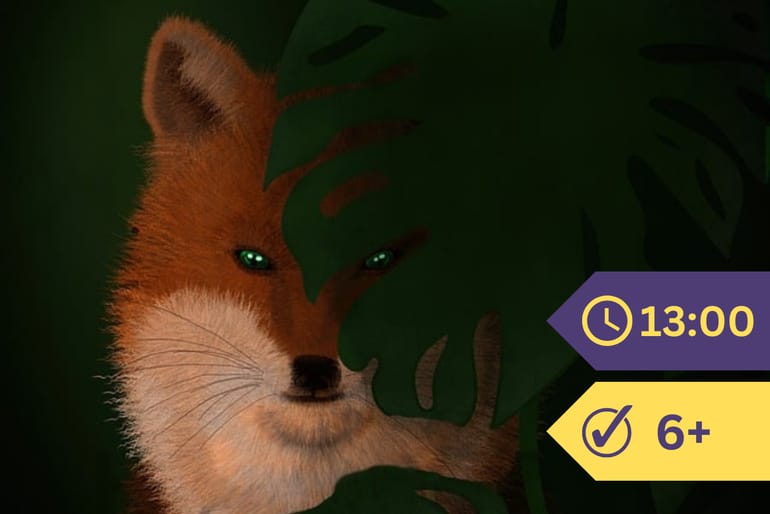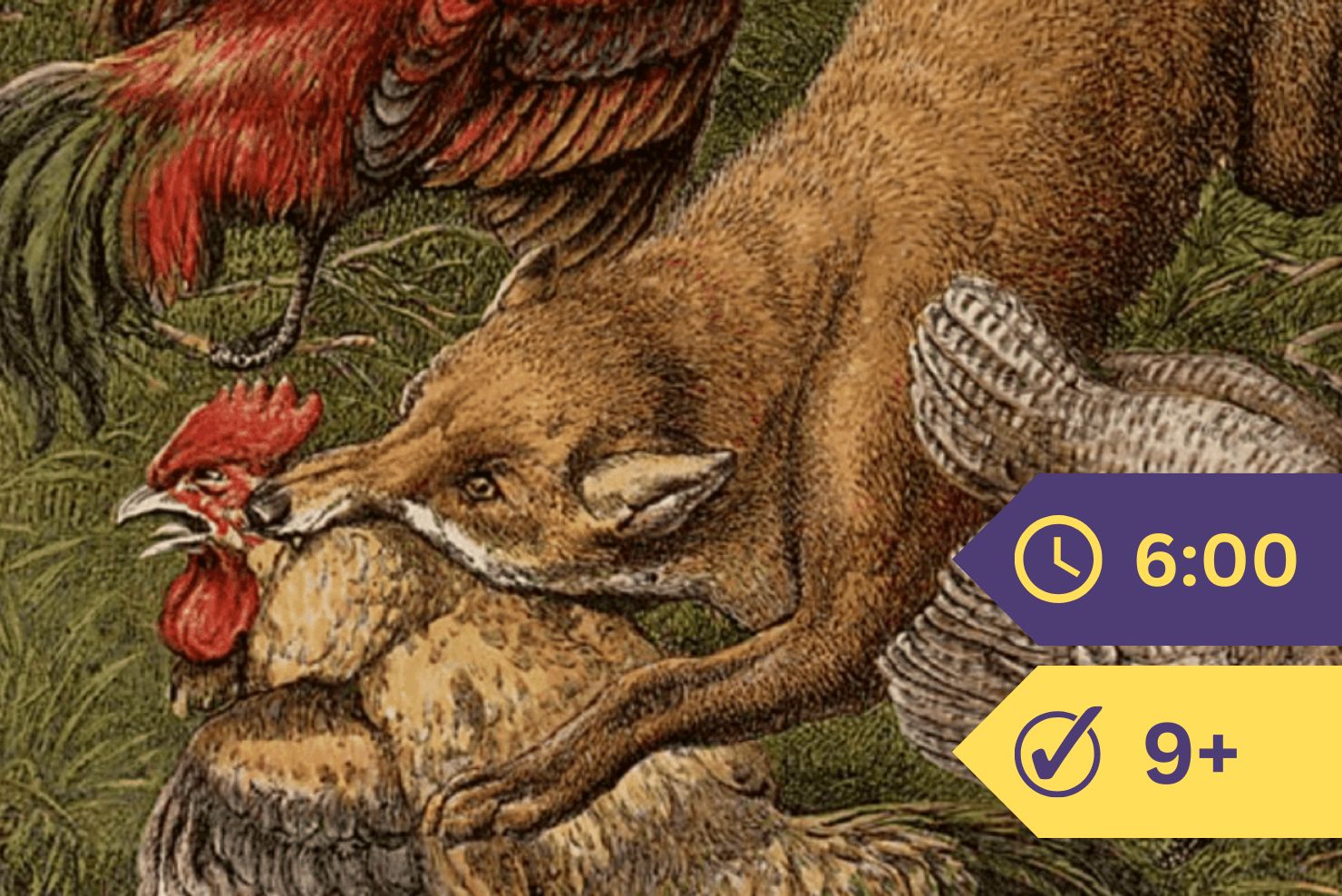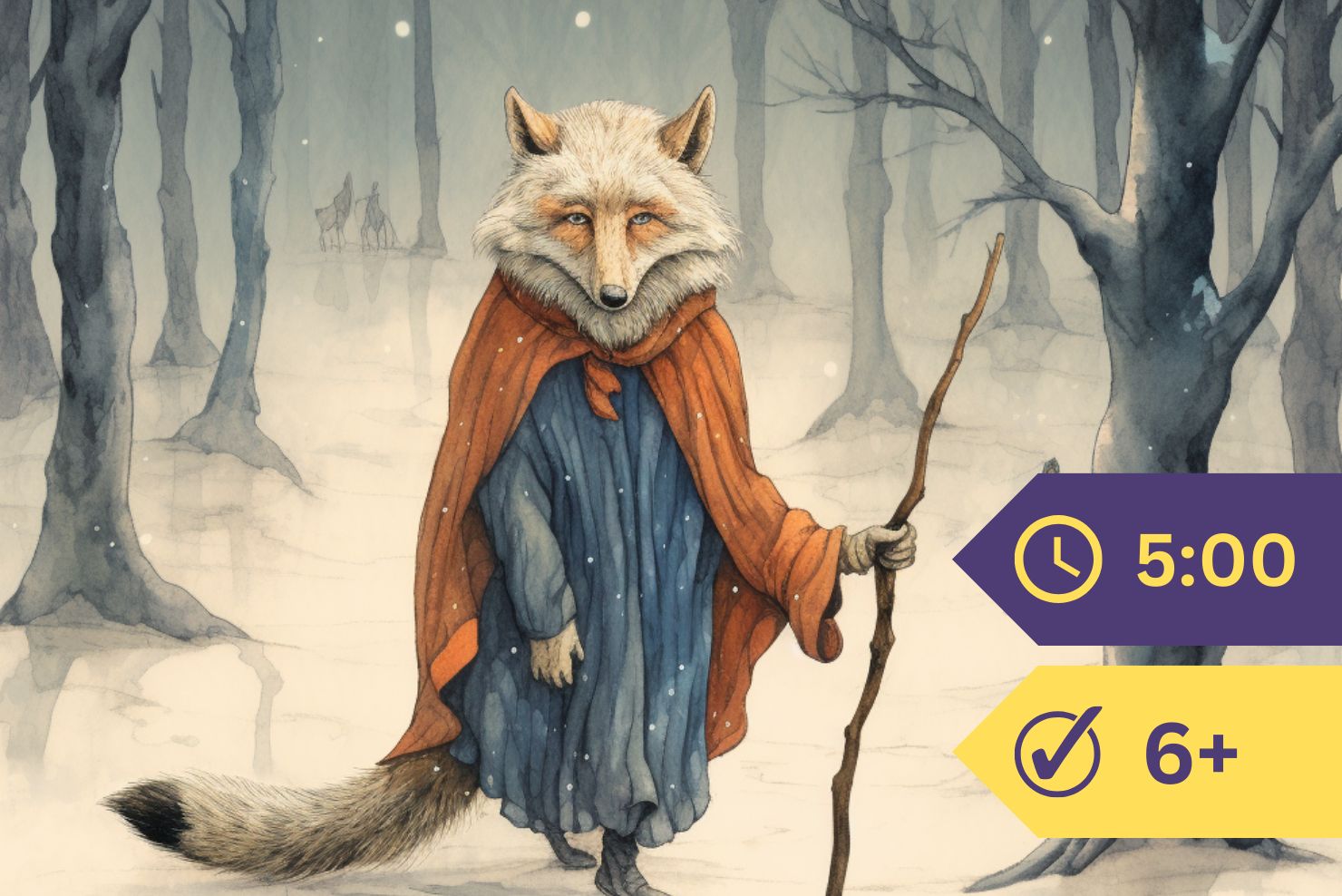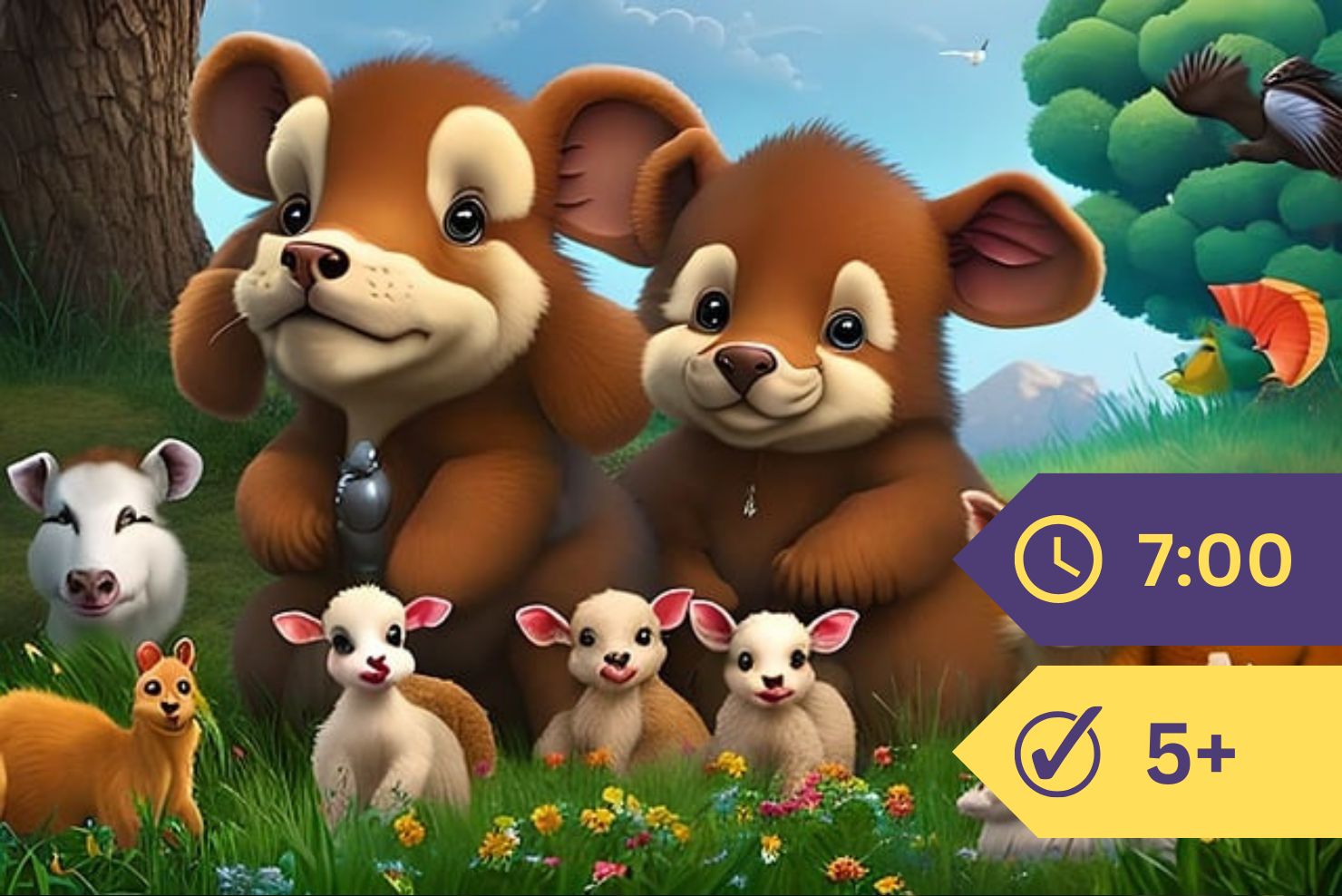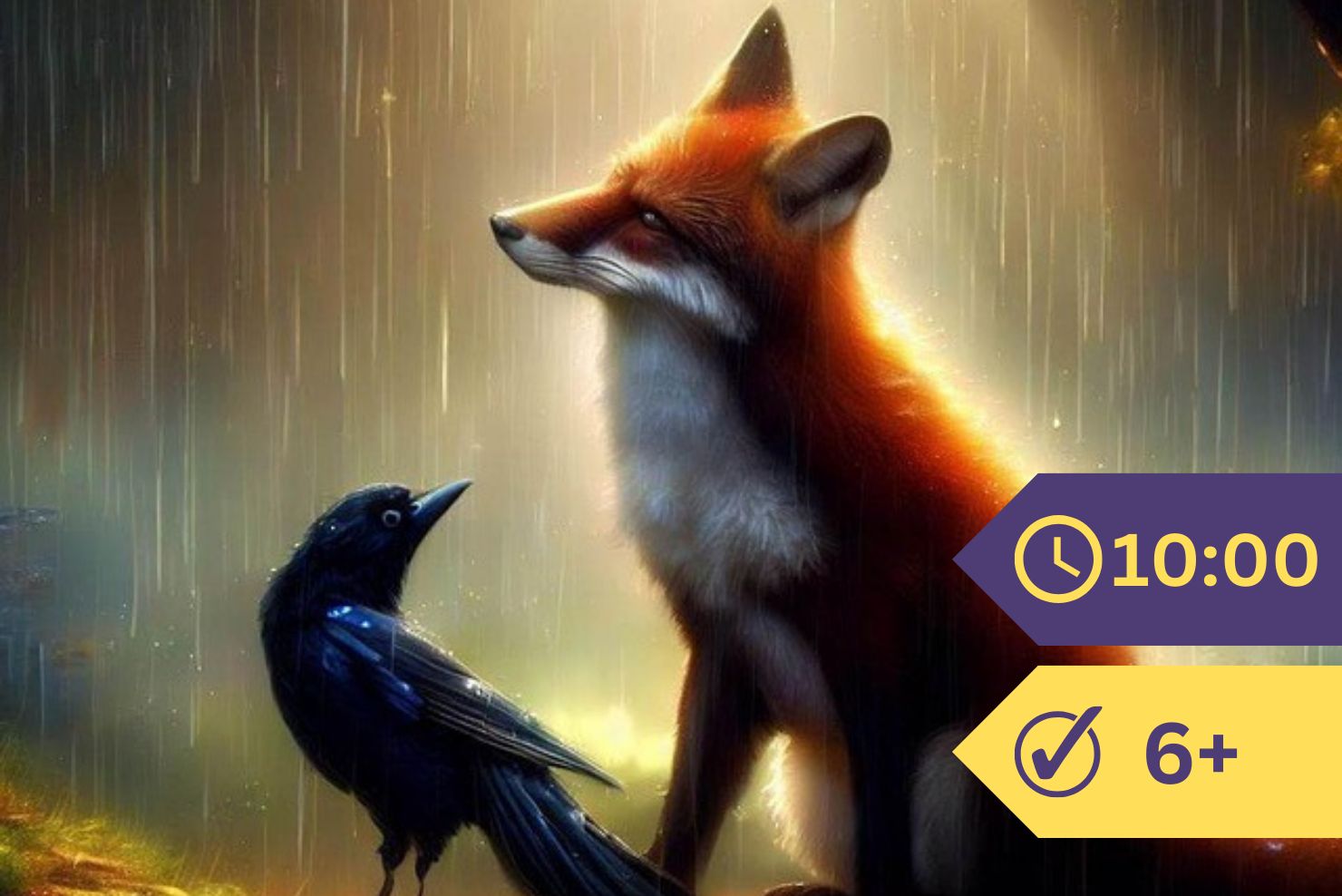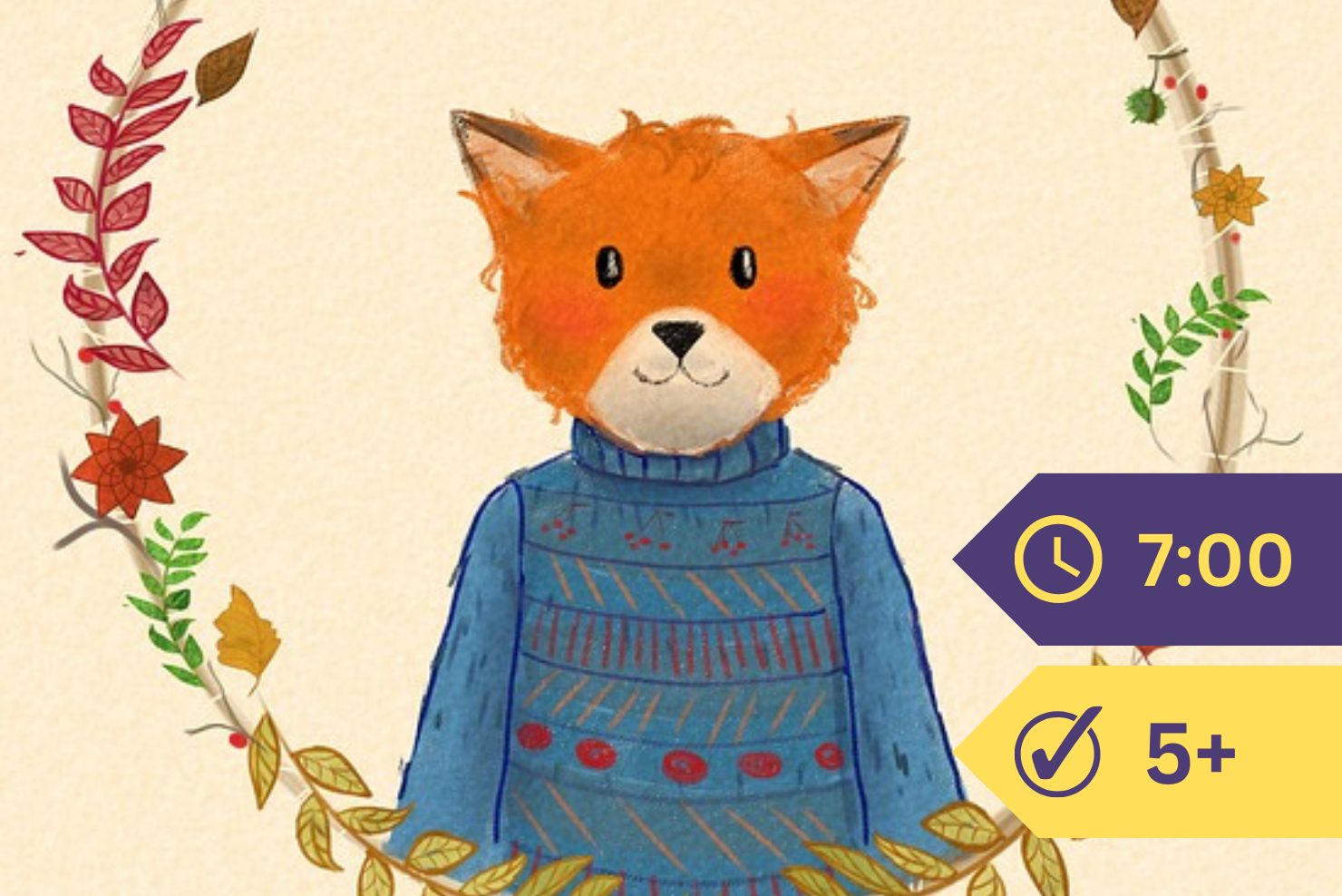“Something must be done, and done at once!” said Reynard one night as he was returning empty-handed from the farms around his part of the country.
“All the farmers for miles around have set traps and are out hunting for all of us wood folks, and if I do not set my wits at work I shall starve; that is certain,” he continued.
Reynard did not go to bed when he reached his home. First, he stirred the fire and made it burn more brightly, and then he put on the tea kettle. Then he put on his old carpet slippers and dressing gown and filled his pipe. When the water boiled in the kettle, Reynard made himself a bowl of hot ginger tea, which he drank, and having gotten all nice and warm, he lighted his pipe, sat down in a rocking chair before the fire, and putting his feet on the stove, he began to smoke, rock, and think all at the same time, which goes to prove that he could do more than one thing at a time.
It was nearly sunrise when he stopped thinking and rocking. His pipe had gone out, but Reynard still held it in his mouth because he could think better with it there, he said.
“I have it,” he said at last, slapping his knee and jumping up so quickly that he upset the rocking chair, but he did not stop to pick it up; he was too much interested in his scheme just then.
Reynard went to his pantry, which was almost like Old Mother Hubbard’s, and found a crust of bread which he had overlooked the day before. This he put hot water over and a pinch of salt and ate for his breakfast.
He could hardly wait for the sun to be well up before he started out calling on the wood folk.
Reynard called at Mr. O. Possum’s house first and then at the home of Mr. Rack Coon; then he stopped at the door of Mr. J. Rabbit and Mr. Squirrel, and then he knocked at the door of Mr. Bruin Bear.
Each one he told to be at his house at noontime as he had something very important to tell them.
Everybody hurried with the work that morning, for they were all as anxious as could be to hear what Reynard had to tell them. After they were all seated on the ground in front of the house, Reynard came out and sat on the doorsteps.
“My friends and neighbors,” said Reynard, looking very serious and speaking in a serious tone as well, “I have called you all here upon a very vital question. Of course, you all know what vital means, so I will not stop to explain.”
Each wanted the other to think he was wise, so they all said they knew perfectly well what the word meant, though they really had not the least notion.
“We will proceed then,” said Reynard. “We wood dwellers have done a great deal of wrong in the past—we have stolen the farmers’ vegetables.”
Up jumped Mr. J. Rabbit and Mr. Squirrel and Woody Chuck and opened their mouths to object, but Reynard held up his hand. “Wait!” he said.
“And we have stolen the farmers’ poultry and his pigs, and even a lamb once in a while.”
“I have not tasted a lamb in an age,” growled Mr. Bruin Bear, “but I should like to; I do not mind admitting it. Please be quiet, my friends,” said Reynard. “I know, as I told you at the beginning, that this is a vital subject.”
“Just as I thought; it means something to eat,” whispered Woody Chuck to J. Rabbit.
Reynard continued with his speech. “This is a vital subject, and I know it will be hard on us fellows for a while, especially Mr. Rack Coon and Mr. O. Possum and myself, and even Mr. Bear, but I feel we must overcome our habits, which I have come to the conclusion are bad; very bad, indeed.”
Everybody sat up straight now and listened, wondering what could be coming next, for everybody in the woods knew how much Reynard thought of eating.
“Yes, we must give up stealing food from the farmers,” said Reynard. “It is not right, and what is not right is wrong, and to do wrong is to be wicked, and I feel sure none of us wish to be wicked, my friends.”
Everyone looked solemn as an owl and said they did not wish to be wicked.
“Then, my friends, we must stop going to the farmers around here and live on the things we find in the woods. I am sure we will be happier and better for it,” said Reynard. “Now, how many are willing to be wicked?”
Of course, not one raised his hand or stood up, and Reynard said, “Good, I knew all my friends and neighbors wanted to be good, as much as I did, only no one ever mentioned it to them.
“Now, from this time on, all of us are to live on roots and leaves and nuts and things, and never, never again go to any of the farms. Is that agreed upon?”
Everybody said “YES,” but no one looked happy but Reynard, and Woody Chuck told J. Rabbit, as they went along the path home, that he intended to make himself sure that Reynard kept his part of the agreement, for he never did trust him, and for one of the Fox family to have such sudden ideas about being good seemed very strange to him.
Woody Chuck watched and watched, but not once did he catch Reynard going out of the woods, and he began to think perhaps he had wronged the Fox family, when one night he saw Reynard stealing out of the house with a bag over his shoulder.
“Ah!” thought Woody Chuck, “now we will see, Mr. Reynard Fox, how good you really are.”
I suspect very much you are off for the farms to pick up a few hens or ducks,” and Woody was right, for out of the woods stole Reynard and over the hills he went, and when he returned his bag was filled. He had planned to have all the animals keep away from the farm until the farmers thought they had frightened them away and did not keep such close watch or set their traps any more, and then Reynard would have it all to himself.
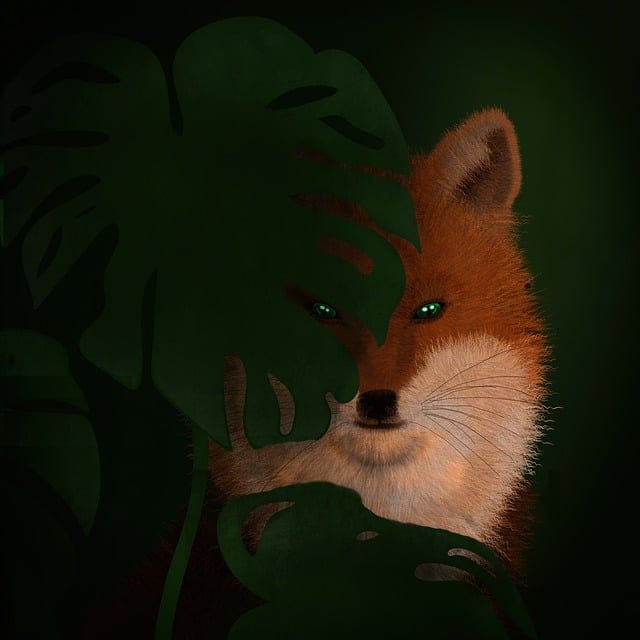
But Reynard did not count on little Woody Chuck; in fact, he had always thought Woody a stupid little fellow, but he was to learn better now. As soon as Reynard had left the woods, Woody Chuck scampered around to all the wood folks’ houses and told them what he had seen, and when Reynard arrived at his own door with the full bag over his back, there they were all waiting for him. From behind the trees and bushes, they all jumped until Reynard thought all the animals in the world had gathered there.
“Good evening, Reynard,” they all said. “You are out very late to belong to our Good Club. What have you in your bag?”
“Squawk, squawk,” went a hen. “Quack, quack,” went a duck, and Reynard did not need to answer; they all knew what he had.
“We will expel him from the Good Club,” said Woody Chuck. “He is wicked according to his own idea of wrongdoing and no longer fit to be a member.”
Reynard looked very foolish and upset, too, but he brightened in a minute and said, “My friends and neighbors, you do me wrong. I have this night prepared a little surprise for you, knowing just how much you have denied yourselves by belonging to this club, and as I was the one who started the club, I wanted to reward you all for being such good members.
“But like all good intentions, mine have been misunderstood, but I will explain if Mr. Woody Chuck will allow me to do so.”
“Go ahead,” said Woody, showing his long front teeth as he smiled at Reynard in a most sarcastic manner.
“If you can explain your actions this night and still be an honored member of the Good Club, we will be glad to hear you.”
“I can and will explain, and in a most satisfactory manner, to all members, I assure you,” said Reynard.
“I have in this bag two fat ducks, five fat hens, and five geese, to say nothing of turnips and cabbages and a small pig for Mr. Bruin Bear.
“This I brought on my back over all the hills to give you all a party tomorrow night and celebrate the anniversary of our Good Club, which was started just a month ago.”
When Reynard had finished his speech, everybody looked at poor Woody Chuck, but he still showed his long front teeth and said very calmly, “I feel sure this is a surprise party, Reynard, but if there had not been a surprise, I doubt very much if there would have been a party—for us at any rate.
“But I am satisfied if the others are and shall not ask for you to leave the Good Club. But there is something I wish to ask. It is this: When you started this club, you made a speech and spoke of the subject as being vital. Did you not pronounce that word wrong? You meant victuals, didn’t you, Reynard?”
“Well, maybe I did,” said Reynard, glad to get out of such an embarrassing position so well. “Anyway, it is victuals tomorrow night, and plenty of them.”
“Make it tonight,” said Woody, not at all sure there would be a tomorrow as far as the bag of food was concerned, and everybody else saw the point and said, “Yes, tonight is a fine night for a party.”
When everybody had eaten all he could and was feeling happy, Woody Chuck arose from the table and said, “I think our friend Reynard has proved that this club is well-named. This is a Good Club, and this has been a good party, and Reynard is a good fellow (when he has to be).” This last part he said to J. Rabbit, who laughed so hard he fell off his chair.
“Oh, we are all jolly good fellows,” sang all the animals as they went home, but Reynard sat smoking by the fire, his feet on the top of the stove, and he rocked fast as he thought, “I wonder if that stupid little Woody Chuck caught me all alone, or did O. Possum or Rack Coon set him up to it?” He never knew, but the Good Club still exists in the woods, where they all live, though it does not mean the same sort of good Reynard intended it should when he started the club.
The animals all like it much better, for it means something good to eat when they have a meeting of the club once a month, and everybody then agrees again that the Good Club is rightly named.

